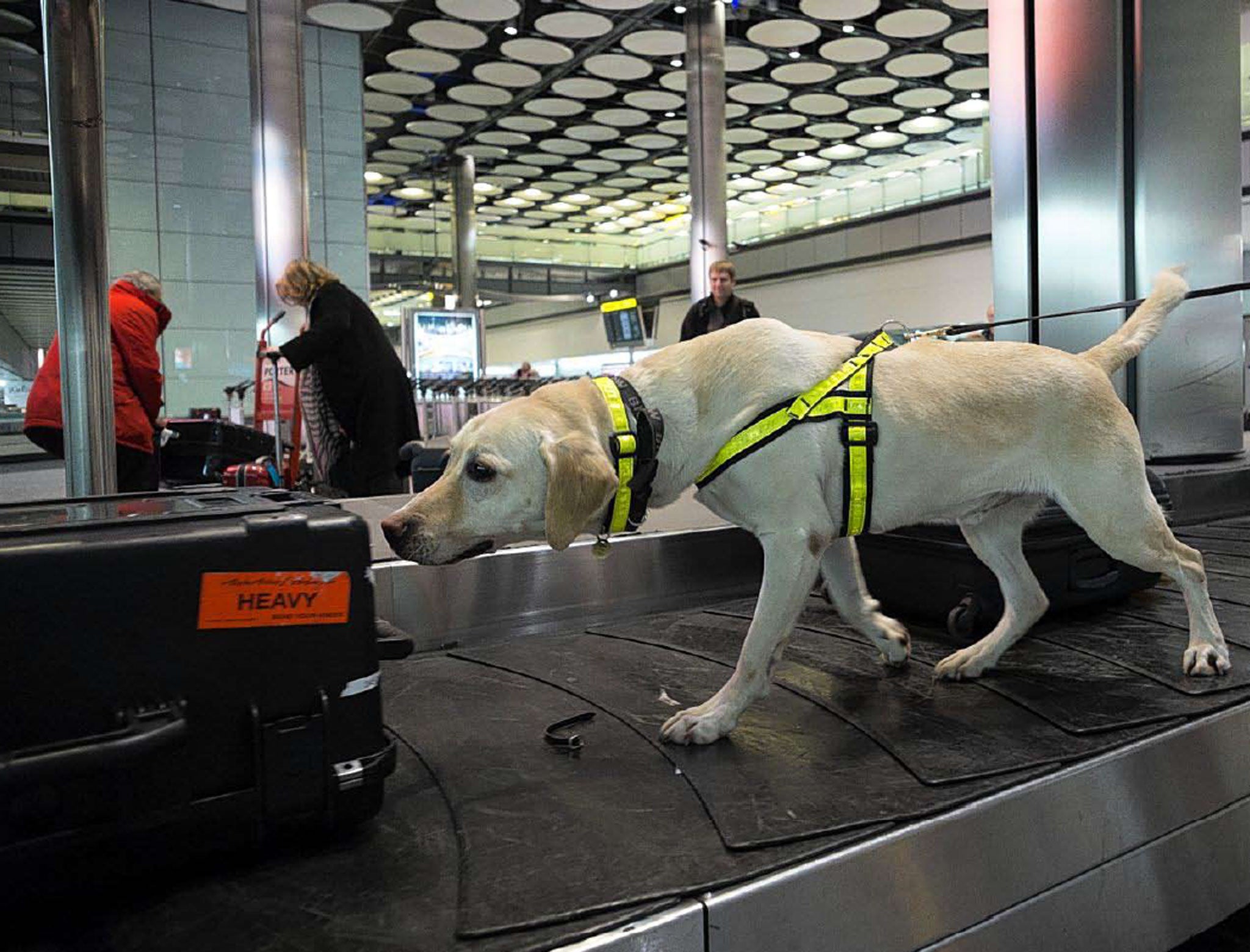Noses for trouble: The team trying to counter the trade in animal parts
At Heathrow, contraband from duck tongues to heroin is being sniffed out

At the Heathrow base of the crack detection team that combs through incoming luggage and freight hunting illegal imports, unit manager Roma Garrett maintains a remarkable leaderboard of her team’s most notable seizures. In December one operative found £17,500 in cash, while another alighted on 19kg of heroin; back in July, a triumphant entry recorded the discovery of a major stash of unlicenced yoghurt balls.
One team member in particular has displayed a real aptitude for catching those who perpetuate the illegal wildlife trade, a criminal industry that devastates vulnerable communities and habitats and is worth billions every year. Among his seizures are 35kg of emu oil, 1.5 tonnes of buffalo meat, and, in one memorable operation, matching snakeskin coat, shoes and handbags. Impressed by these results, I ask Sam O’Connor, his immediate superior, what sort of incentive scheme she uses. “Well,” she says brightly, “whenever he finds something he gets a biscuit.”
The operative in question is Tyke, a blond eight-year-old Labrador with a cheerful disposition and an extremely important job. He and rest of Heathrow’s canine detection team are charged with identifying, by nose, all manner of contraband coming into the country. Tyke’s specialism is POAO – Products of Animal Origin, the smuggling of which has drawn particular attention in advance of this week’s London Conference on the Illegal Wildlife Trade, which begins on Thursday and is focused on the trade in elephant, rhino and tiger products.
Heathrow is a particular hotspot because of its status as a hub airport, which means it is used by traders looking to avoid the obvious routes – like the one from southern Africa, the home of the white Rhino, to China, where the animal’s horn is believed to have medicinal qualities.
Seizures are regularly made, significant and bizarre alike: only last week, two women were arrested after they arrived from the Bahamas carrying 13 endangered iguanas hidden in socks.
Tyke and his colleagues mostly operate behind the scenes at Heathrow, running their sensitive noses over the freight and passenger sides of the transport hub alike. Often, while you’re waiting for your bag in the luggage hall, there’s an eager Labrador or spaniel pacing the carousel on the other side of the wall. The dogs also work the customs channels.
One day last week, though, Tyke came out into full view to demonstrate his skills. After O’Connor gave him the word, he leapt on to the carousel and trotted conscientiously along it, giving every passing bag a quick sniff. How can his handler tell when he’s found something? “He’ll get excited,” O’Connor says, “and his tail will tend” – she whirls her index finger like a rotor blade – “to do this.”
There’s nothing dodgy on the flight from Madrid. But when Garrett adds a training bag to the mix, Tyke quickly picks it out: he butts his nose against it repeatedly, and, sure enough, swirls his tail so vigorously that he looks as if he might take off. The contents, for the record, are the previous day’s haul of sausages and duck tongue. But all Tyke sees of it is another biscuit.
Meanwhile, half an hour away at Kew Gardens, Tyke’s human counterparts are undergoing training in picking out illegal products from the bewildering range of plant and animal material that passes through Britain’s ports and airports every day. Kew plays a vital role in the process of picking out contraband, performing sophisticated tests to confirm or disprove customs officials’ suspicions. With the illegal ivory trade doubling since 2007 and a 5,000 per cent increase in rhino poaching since the same year, it is work that has risen up the political agenda.
“This is an international trade second only to drugs or armaments,” says Norman Baker, the Liberal Democrat minister for crime prevention, as he watches police and customs officers peering at stuffed owls, crocodile skins, ginseng, and a bodybuilding supplement that is illegally produced from orchids. With 35,000 species covered by the Convention on International Trade in Endangered Species (Cites), they have their work cut out.
“The world is moving in the right direction in terms of governments,” Baker says. “But the ability of people to exploit animals and plants is moving in the wrong direction, because the capacity of people to have semi-automatic machine guns or whatever is much greater than it was. We’re in a race against time.”
To sharpen their skills, a few traps lie in wait for the officers. Elephant dung is included in the mix of products they are looking at, even though it’s perfectly legal to import it (should you so wish) – because, says trainer Guy Clarke, “sometimes people see the word ‘elephant’ and just assume it’s against the law”.
On the other hand, another specimen with accompanying paperwork that identifies it as mammoth tusk, and hence not protected, is in fact that of an elephant. You can tell the difference, says Clarke, if you look closely at the criss-cross pattern on the ivory.
Such a vast range of scientific and legal knowledge is required that it seems a wonder that officials are able to keep on top of it all. They are not helped in their endeavours by trends in popular culture that can give them even more to do. “When you had those chameleons talking to each other in that Budweiser ad, suddenly we had a huge surge in chameleon imports,” Clarke says wearily. “And then there were those Harry Potter owls. It doesn’t make it any easier.”

Join our commenting forum
Join thought-provoking conversations, follow other Independent readers and see their replies